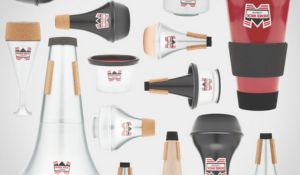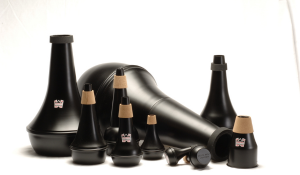
As every teacher knows, a good tone on any brass instrument needs a properly set-up embouchure; these days one may assume that the young player will have a reasonable instrument and a sensible mouthpiece. To this one could add what many teachers would regard as the most important of all – good breath control.
One aspect of the brass-blowing body-machine which is hardly ever emphasized enough is the throat. By opening the throat area, or closing it, the tone-quality can be varied enormously. Although the differences are not quite as much as in singing, they can easily be heard, on any brass instrument. It remains a problem, however, to put across to the young player the concept of “open your throat!” Many ideas like “swallowing a football”, “yawning outwards” or “cooling a hot potato” can work to a greater or (usually) lesser degree, but the use of a Denis Wick practice mute can very easily solve the tight throat problem and also dramatically improve breath-control.
The difficulty that youngsters have with breathing well, often stems from the fact that they are hardly ever allowed to play a maximum ff, and for good reason, nobody practices loudly! Trying to breathe well through a tight throat is fairly impossible anyway, so what one often hears is poor breath support and a rather choked sound.
Try the following:
1) The “Before” Test
(Remember exactly how this sounds) Play mp the first 5 notes of the scale of F (In treble clef the scale of G (second line)) just mp, remember!
2) Play, with the practice mute inserted, low Bb (C) loudly.
Take a deep breath, holding shoulders down, play louder. The note becomes less controlled with increasing volume. Try again, much louder. You will notice, as the volume increases, a “buzz” or rattle from the end of the mute. This “buzz” wobbles and fluctuates. Keep trying to play even louder, make sure that the “wobbles” become more level. Breathe as deeply as possible. Push the air through in a controlled way. Keep increasing the volume. If you begin to feel slightly dizzy, that is quite normal (Hyperoxygenation). Now, with the same or more volume, play a semitone lower gradually progressively descending a semitone at a time, until you are playing the loudest low E (F#) you have ever heard, continuing to breath as deeply as possible. I always describe this as the brass-player’s equivalent of weight lifting.
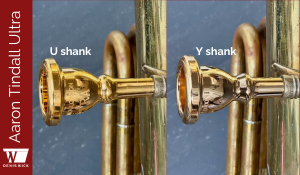
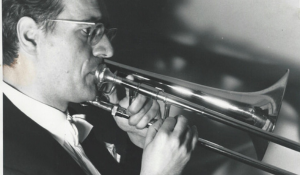
Denis Wick once said, "Eventually, when you're talking about playing. you've got to do something with bits of metal because the human body can't do everything." One of the things that most elevates Denis Wicks mouthpieces, or "Bits of Metal" as Denis refers to them, was his understanding of the human body and how it works together with the instrument to make music. Through the lens of a virtuoso trombone player and professor, this simple advice and instruction is universal for every instrument.

When you search for a mouthpiece, what measurements do you look toward to make sure you will find the perfect fit? Our suggestion is to always start with diameter. The 4 dimensions you will see on nearly every mouthpiece manufacturer’s website include diameter, rim width, throat, and backbore. Each of these physical measurements will give you an idea about what level of comfort and support the mouthpiece will offer your individual needs. You’re missing one, though...
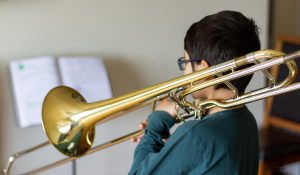
Navigating your child’s band/orchestra experience as a parent can be challenging – as a parent of two music students, I can personally attest to this! Many of us may have memories of our own band experiences, and some – like myself – are musicians/teachers who have very specific thoughts on how music students should work. The following are some thoughts on what you should expect from your student’s practice sessions from my experience as an educator and a parent.

Hi, my name is Kate Amrine and I am a professional trumpet player and educator. I also love to cook and eat new foods. One of my favorite aspects of traveling to a new place is exploring the food scene. I discovered a cooking series on YouTube where a food scientist has three chefs of different levels (amateur, home cook, and expert) make the same dish yet in their own ways given their skillset and then it is evaluated afterwards.

Hi, my name is Kate Amrine and I am a professional trumpet player and educator. I also love to cook and eat new foods. One of my favorite aspects of traveling to a new place is exploring the food scene. I discovered a cooking series on Youtube where a food scientist has three chefs of different levels (amateur, home cook, and expert) make the same dish yet in their own ways given their skillset and then it is evaluated afterwards.

Although you might still be considered a beginner, you are actually gaining a lot of knowledge in the first 3-4 months. You've learned how to produce sounds consistently and are getting the hang of scales and rhythm, which means you’re starting to play some songs. You’re also figuring out how to deal with sticky valves, slow slides, discovering the importance of the spit valve, and some of you may have already experienced getting your mouthpiece stuck at least once. While you’re not professionals yet, you’ve reached a stage where it might be time to start considering your first accessory upgrades.

As a professional musician, there is no shortage of things to practice. We have scales, flexibility, sound production, range, articulation, technique, extended technique, etudes, excerpts, solo repertoire, improvisation, ii-V-Is, and on, and on, and on! Sometimes this list can feel overwhelming and like there is never enough time to get everything done.
Unfortunately, I must add one more thing to the list – possibly one of the most important, but often overlooked elements of music: Intonation.

